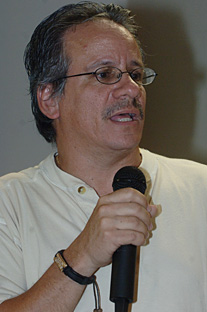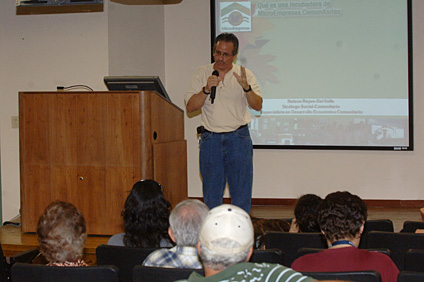|
|
|
Friday, May 22nd, 2009 [ versión español ]
The University: A Valuable way of Life.
Antonio García Padilla
|
 |
|
During the fair, professor Nelson Pérez gave the presentation Incubator of Community Micro-entrepreneurs. |
|
|
Science and technology should respond to the social reality of the community in which the University is located.
This was the message that came about after the conclusion of the 2nd Symposium, entitled, University Transformation from the Community Perspective, that was recently celebrated by the University Institute for the Development of the Communities of the University of Puerto Rico at Mayagüez (UPRM).
“The symposium was directed so that we continue to reflect on how the university should transform itself from the realities of the excluded and vulnerable communities; and transforming itself signifies that our curriculums have to be moderated for these population sectors, and that not only our curriculums should respond to multinational institutions,” mentioned professor Luisa Seijo Maldonado, director of the Institute.
In fact, during the symposium it was established that the University should intervene in all the important topics of the actual society and because of this, formal education should also focus on popular education.
During the activity, professors from other campuses of the University of Puerto Rico (UPR) shared their experiences in projects of creating ties and developing the communities in which they work; they dealt with the urban aspect of these universities and their ability to function within the communities in which they are located, in particular, public universities or government run universities.
That was the case of doctor Juan Giusti Cordero, director of the CAUCE Project, of UPR at Río Piedras, that works with different community projects, with their residents, with the mission of revitalizing the city limits of the sector.
Giusti emphasized that for an institution to obtain the classification of an urban university, “it’s not enough just to be located in the city or to have community outreach projects.”
“Based on the experiences that we have had in Río Piedras, what we see is that an urban university should have complete commitment to the city and this, as much in the content of its academic programs as in its methods for evaluating professors, the way it compensates professors, where the practical experience that these professors have in the urban environment should be taken into account,” noted the specialist. He added that the installations and facilities where students take their classes are also vital aspects, the same as displaying a curricular commitment with the urban area.
Also, during the event they gave details about the working models in the communities although they specified that it’s with the model of self-management that they can achieve the greatest community transformation.
The 1st Symposium of University Transformation took place in 2003.
The Institute also realized a second community fair, UPRM and Puerto Rico: One Sole Community, in which diverse activities took place such as artistic presentations from community groups, poster exhibitions and workshops on social entrepreneurship, home gardens and environmental care, among others, all with the intention of promoting self-management and the development of the vulnerable sectors of the Island.
Video
Verify that your navegator can ejecutate javascript and that has the most recent version of Adobe Flash Player. Dowmload Flash Player

The symposium and the fair were carried out by the University Institute for the Development of the Communities.
Photographs by Carlos Díaz / UPRM Press
|

